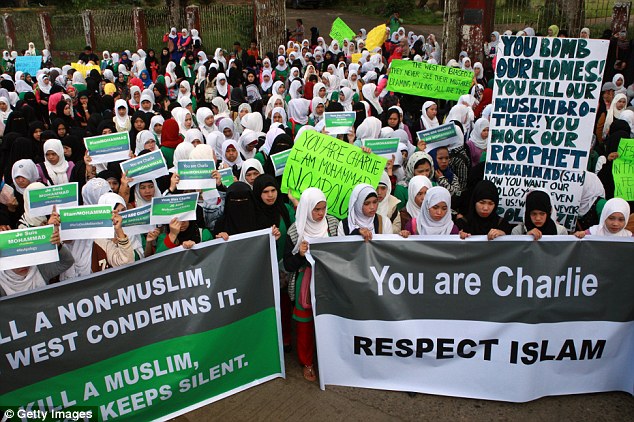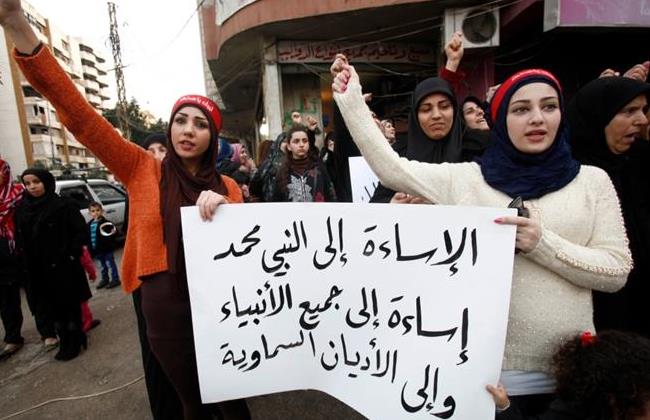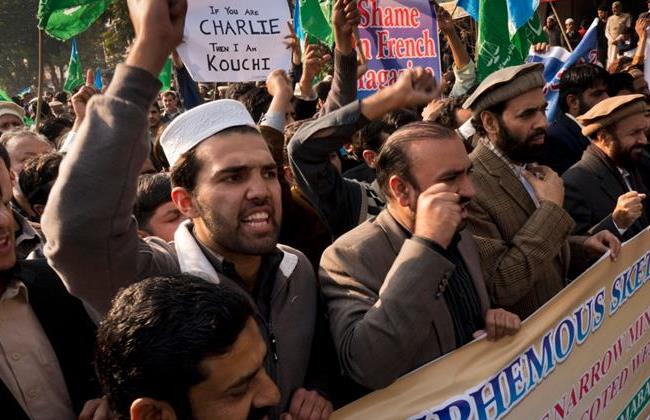
Beirut, Lebanon – A cover illustration of Prophet Muhammad in the latest edition of the French satirical newspaper Charlie Hebdo ignited controversy in the Middle East on Wednesday, prompting Egypt and Turkey to issue or threaten restrictions on publication of the images and stirring wide debate over religion and free speech.
Some were outraged, while others called for free speech in countries like Saudi Arabia and Egypt that punish people for alleged blasphemy. Many expressed indifference, saying they were weary of debating cartoons that paled in significance beside the carnage taking place in wars in Syria, Iraq and elsewhere in the region.
In Egypt, President Abdel Fattah el-Sisi issued a decree giving the prime minister authority to ban any foreign publications “offensive to religion,” the state-owned daily Al Ahram reported. Mr. Sisi has portrayed himself as a secular bulwark against Islamists.
Egypt’s official religious institutions have had mixed reactions to the new cartoon.
Dar al-Ifta, an organization of Sunni scholars, criticized the French publication on Tuesday for its decision to continue printing cartoons depicting the prophet, saying it would “cause a new wave of hatred in French and western societies” and declaring that the magazine “does not serve coexistence and the dialogue of civilizations that Muslims seek.”
But Al-Azhar University, the foremost institution of Sunni scholarship, on Wednesday called on people to “ignore” the cartoons. “Ignore this unpleasant trifle,” the statement advised, “because the Prophet of mercy and humanity (peace be upon him) is on too great and high a level to be affected by drawings that lack ethics.”

The Egyptian Family House, an organization of the country’s main Muslim and Coptic Christian authorities, issued a statement decrying the cartoons because they “increase the gap between people and religions” and calling on media outlets not to “negatively target the prophets and the heavenly religions, and not to provoke the feelings of Muslims.”
Egyptian courts have recently sentenced a 21-year-old student to three years in jail for atheism and what were deemed blasphemous statements on his Facebook page, and a Christian man was sentenced last year to six years for “insulting Islam.”
In Turkey, like Egypt a large and influential Muslim country, a local court in the southern city of Diyarbakir ordered the blocking of sections of four websites that showed the new cartoon, the semiofficial Anadolu news agency reported.
The image depicts Muhammad weeping and holding a sign saying “I am Charlie” in French, the slogan adopted by many of those protesting the attack by Islamist extremists on the Charlie Hebdo headquarters, which killed 12 people.
“Insulting the prophet can never be regarded within the context of media freedom,” Ercan Ezgin, a Turkish lawyer, wrote in the complaint that prompted the ruling in Diyarbakir, according to the CNN Turk channel. “This cartoon bears the danger of deeply provoking billions of Muslims. It should never be acceptable to depict our prophet in such a cartoon, poking fun at him, showing him as if he’s shedding tears.”
But one Turkish website, T24, translated the entire new issue of Charlie Hebdo into Turkish and those pages were still accessible Wednesday evening.

In the early morning hours on Wednesday, the Turkish police halted trucks distributing Cumhuriyet, a left-wing newspaper that carried four pages from Charlie Hebdo’s new issue. Distribution resumed only after investigators checked the contents of the paper and concluded that none of the cartoons represented the prophet, Turkish news media reported.
The newspaper received numerous threats over the phone and the Internet. Near the Cumhuriyet headquarters in central Istanbul, the police detained a protester who carried an Islamic flag, shouting, “You will not attack my religion, my prophet,” according to CNN Turk.
Three more protesters were detained close to Cumhuriyet newspaper premises late Wednesday after they held signs carrying death threats against any one who insulted Islam and its prophet.
“If you have limitless freedom of speech, Muslim community has limitless right to protest,” one handwritten sign read, a photograph posted on Twitter showed.
Hezbollah, the Lebanese Shiite group whose leader, Hassan Nasrallah, last week criticized extremists who kill those they consider infidels in the name of Islam — without explicitly denouncing the Paris killings — released a statement Wednesday condemning the new cartoon.
“Such an action is absolutely rejected,” it said. He called cartoon “a big provocation to the feelings of more than one and a half billion Muslims in the world, all of them believers in heaven’s messages and keen for dialogue and common values. Such actions directly contribute to supporting terrorism, extremism and extremists.”
NY Times

Leave a Reply
You must be logged in to post a comment.